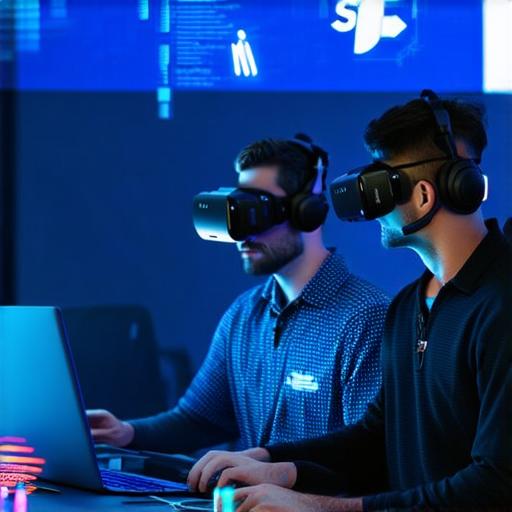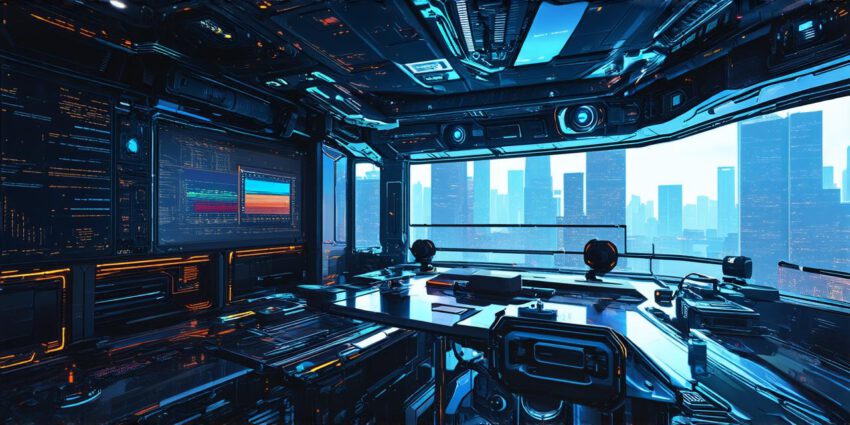Virtual reality (VR) is an exciting and rapidly evolving field that has the potential to revolutionize the way we interact with technology. As more businesses and individuals embrace VR, the demand for skilled developers continues to grow. If you’re interested in becoming a virtual reality developer, there are several key skills and qualifications you need to acquire.
1. Technical Skills
Virtual reality development requires a strong foundation in computer science and programming. Developers must be familiar with programming languages such as C++, Java, and Unity, which are commonly used in VR development. Additionally, developers should have experience working with graphics processing units (GPUs) and have a basic understanding of physics engines like Havok or Unreal Engine.
To gain technical skills, you can start by taking online courses or enrolling in a degree program in computer science or game design. Some popular online platforms for learning VR development include Udemy, Pluralsight, and Coursera. Additionally, there are many open-source projects available that allow developers to contribute to the VR community while gaining experience.
2. Creativity
Virtual reality development requires a great deal of creativity, as developers must be able to imagine immersive experiences and bring them to life in a digital environment. Developers should be familiar with design principles such as color theory, typography, and visual hierarchy, and have a strong understanding of user experience (UX) design.
To cultivate creativity, you can start by experimenting with different software tools and platforms that are designed for VR development. You can also explore various industries to gain inspiration for unique and innovative VR experiences. For example, the healthcare industry has already started using VR technology for training purposes, while the entertainment industry is exploring new ways of creating immersive gaming experiences.
3. Problem-Solving Abilities
Virtual reality development requires strong problem-solving skills, as developers must be able to identify and overcome obstacles in real-time. This can include troubleshooting technical issues, debugging code, and finding creative solutions to design challenges.
To develop problem-solving abilities, you can start by breaking down complex problems into smaller, more manageable parts. You can also work on open-source projects or participate in coding challenges to gain experience solving real-world problems. Additionally, collaborating with other developers and seeking feedback from others can help you identify areas for improvement.

4. Experience with VR Hardware
Virtual reality hardware is constantly evolving, and developers must stay up-to-date with the latest technology to create cutting-edge experiences. Developers should have experience working with VR headsets such as Oculus Rift, HTC Vive, or PlayStation VR, and be familiar with the unique features and limitations of each platform.
To gain hands-on experience with VR hardware, you can start by building simple VR projects and gradually increasing the complexity of your work. You can also attend VR conferences or workshops to learn from industry experts and try out the latest VR technology.
5. Portfolio
A strong portfolio is essential for virtual reality developers, as it showcases their skills and experience to potential employers. A portfolio should include examples of your previous work in VR development, including code samples, screenshots, and videos that demonstrate your ability to create immersive experiences.
To build a strong portfolio, you can start by creating simple VR projects and gradually increasing the complexity of your work. You can also collaborate with other developers or join online communities to showcase your work and receive feedback from others. Additionally, participating in coding challenges or open-source projects can help you gain exposure and build your network.
Conclusion
Becoming a virtual reality developer requires a combination of technical skills, creativity, problem-solving abilities, experience with VR hardware, and a strong portfolio. By acquiring these skills and qualifications, you can unlock the exciting world of VR development and create immersive experiences that have the potential to change the way we live and work.
FAQs:
Virtual reality (VR) is an exciting and rapidly evolving field that has the potential to revolutionize the way we interact with technology. As more businesses and individuals embrace VR, the demand for skilled developers continues to grow. If you’re interested in becoming a virtual reality developer, there are several key skills and qualifications you need to acquire.
1. Technical Skills
Virtual reality development requires a strong foundation in computer science and programming. Developers must be familiar with programming languages such as C++, Java, and Unity, which are commonly used in VR development. Additionally, developers should have experience working with graphics processing units (GPUs) and have a basic understanding of physics engines like Havok or Unreal Engine.
To gain technical skills, you can start by taking online courses or enrolling in a degree program in computer science or game design. Some popular online platforms for learning VR development include Udemy, Pluralsight, and Coursera. Additionally, there are many open-source projects available that allow developers to contribute to the VR community while gaining experience.
2. Creativity
Virtual reality development requires a great deal of creativity, as developers must be able to imagine immersive experiences and bring them to life in a digital environment. Developers should be familiar with design principles such as color theory, typography, and visual hierarchy, and have a strong understanding of user experience (UX) design.
To cultivate creativity, you can start by experimenting with different software tools and platforms that are designed for VR development. You can also explore various industries to gain inspiration for unique and innovative VR experiences. For example, the healthcare industry has already started using VR technology for training purposes, while the entertainment industry is exploring new ways of creating immersive gaming experiences.

